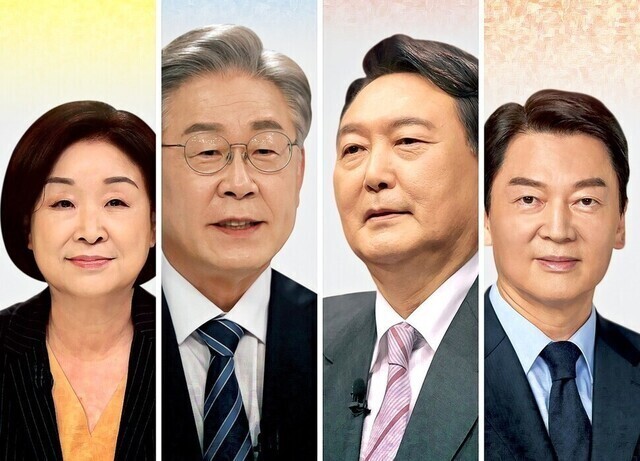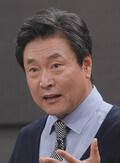hankyoreh
Links to other country sites 다른 나라 사이트 링크
[Column] The 2022 presidential election and S. Korea’s age of transitions


By Kim Nury, professor of German literature at Chung-Ang University
The campaign for South Korea’s 20th presidential election has officially begun. Amidst criticism that it’s “by far the most distasteful election to date” for which voters have been asked to choose from the “worst of the worst,” the race for the Blue House is moving along so oddly, with no heat, hope, or inspiration to speak of. Voters groan that none of the presidential candidates are likable in the least, but the biggest problem of all is that every one of them lacks a vision for the future, a matter that elicits great concern. In an age of great transitions, South Korea has lost its way and is struggling to find its bearings.
In the bigger picture, the 20th presidential election is especially meaningful in three ways.
First, this election marks the first election of the second century of the Republic of Korea, founded in 1919 in the form of a provisional government. Since its establishment, Korea has suffered every historical tragedy a modern nation can possibly be subjected to — from colonization to national division, the Cold War, a civil war, and military dictatorships.
Despite these historical trials, South Korea accomplished a resplendent democratic revolution and awe-inspiring economic growth. Looking back at the glories and shames of the past century, the weight of the next presidency — one that will lead the country into the next century — can’t be light. This election should be the steppingstone for a historical transition for South Korea, through which the country will leap from a century of tragedy into an age of hope.
Second, this election is the first election South Korea is holding as a developed country. Last year, the United Nations Conference on Trade and Development upgraded South Korea from “developing country” to “developed country.” The fact that South Korea boasts the 10th-largest economy in the world, was invited to the Group of Seven summit, and joined the so-called 30-50 club also demonstrates South Korea’s new status as a developed country.
Hence, the next president is responsible for the important task of making South Korea a developed country in the true sense of the term. To accomplish this goal, South Korean society should shift towards one that emphasizes maturity rather than growth, with this election serving as the starting point for such a societal transition.
Thirdly, this election is the first South Korean election of the post-COVID age. The COVID-19 pandemic has demanded the overthrow of our current value system. In this new world, humanity cannot survive unless it reconceives everything there is to reconceive of the world. Particularly, a civilizational transition from a material-based one to one based on ecology is inevitable. As such, this election should set in motion an ecological transition in South Korea.
To sum up, this year’s election is South Korea’s first as it faces a triple transitional period — a historical transition at the dawn of the second century since its founding, a societal transition as a newly minted developed country, and an ecological transition in the age of COVID-19.
Therefore, the newly elected president should be one that can discern the significance of this transitional age and has the vision and capacity to fulfill the demands of great transitions to come.
However, this election is disappointing to the point of despair. First off, the debates happening between presidential hopefuls are exceedingly anachronistic. Instead of looking out for the future, they take South Korea back to the past. Antiquated views on labor, obsolete ideological censorship, and a hostile Cold War consciousness abound.
Next, the landscape of these debates is conservative to the extreme. During the last US presidential election, Bernie Sanders and Elizabeth Warren of the Democratic Party put forth free college, student debt cancellation, free childcare, and a wealth tax as key campaign pledges. In contrast, no South Korean presidential nominee has promised anything remotely resembling the progressive promises of the US Democratic Party. This is a testament to the extreme degree to which South Korea’s political landscape has shifted towards the right.
As well, the debates of this election are so microscopic. Presidential hopefuls who should be making macroscopic plans for the future of the nation are clamoring aboard the ideological bandwagon of complacency, promising “small satisfactions” instead of happiness in the big picture.
Especially worrisome is the regressive attitude of Yoon Suk-yeol, currently projected to be the most likely candidate to win the election. Yoon is the figure least likely to rise to the challenges of the triple transition of our current age. The Republic of Korea in its second century demands a president with a progressive historical consciousness, but Yoon’s views on history are awfully anachronistic. The Cold War consciousness evident from his anti-communist performance, his hostile, confrontational frame of mind demonstrated by his talk of a preemptive strike — these are likely to cause a new crisis of war on the Korean Peninsula.
Moreover, the developed country South Korea calls for a mature, rational leader, but Yoon’s authoritarian personality, deficient sensibility for human rights, and shamanistic tendencies are not fit for a leader of a developed country. Even more, South Korea in the post-COVID age needs a leader with an appreciation for ecology, but Yoon lacks not just an ecological consciousness but basic ecological knowledge.
Above all, the Moon Jae-in administration and the Democratic Party are to blame for Yoon’s rise. That’s because Yoon’s popularity is fueled by anger towards the current ruling party. The Democratic Party should reflect keenly on its faults and honestly ask voters for forgiveness. That’s what the citizens of the candlelight movement deserve at the very minimum, and the minimum requirement for the party to win the upcoming election.
Though the reality seems bleak, I still have hope. The power of organization by mature citizens will ultimately prevent South Korea from falling into the pit of barbarism.
Please direct questions or comments to [english@hani.co.kr]

Editorial・opinion
![[Column] Park Geun-hye déjà vu in Yoon Suk-yeol [Column] Park Geun-hye déjà vu in Yoon Suk-yeol](https://flexible.img.hani.co.kr/flexible/normal/500/300/imgdb/original/2024/0424/651713945113788.jpg) [Column] Park Geun-hye déjà vu in Yoon Suk-yeol
[Column] Park Geun-hye déjà vu in Yoon Suk-yeol![[Editorial] New weight of N. Korea’s nuclear threats makes dialogue all the more urgent [Editorial] New weight of N. Korea’s nuclear threats makes dialogue all the more urgent](https://flexible.img.hani.co.kr/flexible/normal/500/300/imgdb/original/2024/0424/7317139454662664.jpg) [Editorial] New weight of N. Korea’s nuclear threats makes dialogue all the more urgent
[Editorial] New weight of N. Korea’s nuclear threats makes dialogue all the more urgent- [Guest essay] The real reason Korea’s new right wants to dub Rhee a founding father
- [Column] ‘Choson’: Is it time we start referring to N. Korea in its own terms?
- [Editorial] Japan’s rewriting of history with Korea has gone too far
- [Column] The president’s questionable capacity for dialogue
- [Column] Are chaebol firms just pizza pies for families to divvy up as they please?
- [Column] Has Korea, too, crossed the Rubicon on China?
- [Correspondent’s column] In Japan’s alliance with US, echoes of its past alliances with UK
- [Editorial] Does Yoon think the Korean public is wrong?
Most viewed articles
- 1‘We must say no’: Seoul defense chief on Korean, USFK involvement in hypothetical Taiwan crisis
- 2Will NewJeans end up collateral damage in internal feud at K-pop juggernaut Hybe?
- 3[Column] Park Geun-hye déjà vu in Yoon Suk-yeol
- 4Why Korea shouldn’t welcome Japan’s newly beefed up defense cooperation with US
- 5Thursday to mark start of resignations by senior doctors amid standoff with government
- 6N. Korean hackers breached 10 defense contractors in South for months, police say
- 7[Guest essay] The real reason Korea’s new right wants to dub Rhee a founding father
- 8[Column] ‘Choson’: Is it time we start referring to N. Korea in its own terms?
- 9Kim Jong-un expressed ‘satisfaction’ with nuclear counterstrike drill directed at South
- 10[Editorial] New weight of N. Korea’s nuclear threats makes dialogue all the more urgent